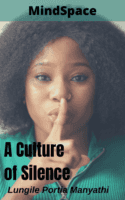I always sit at family gatherings and silently wonder why some people are not there, why certain people are at each other’s necks and others do not speak to one another. I cannot ask because I know the elders will casually hand me the words,
“We do not speak of such things”.
I refer to them as elders because they consider me to be a child. Growing up, I was taught never to question issues that are deemed to be beyond my understanding or none of my business. They are the people who witness the unfolding of events, hold testimonies of transgressions and possible solutions. Yet, they say nothing. It seems easier for them to pretend those issues do not exist or that they can be overlooked. They fail to realise that those well kept secrets grow with us, pass through the lips and ears of relatives as whispers of destructive gossip. In instances when my own ears catch on and piece the stories together, I am told “Never to breathe a word about what I have just heard” or it that it is “not my place to open old wounds”. Hence, we breed and foster a culture of silence.
Broken relationships and unsolved matters have damaged my family over the years. I have listened to the snippets (of stories) long enough to know that most of the damage is caused by miscommunication and misunderstanding. These problems are worsened by pride because my elders do not like admitting their mistakes, are afraid of exposure and embarrassment. Hence, silence is upheld with the aim of protecting a family member’s name, their feelings and reputation. The family overlooks the destruction and division caused by keeping quiet about unresolved issues or ignoring them. Growing up, we, as children, were taught to turn a blind eye to the division and opposing sides that exist in the family. However, we were positioned against one another, against other members of the family and burdened to avenge generations of pain that we know nothing of.
Last year I stumbled upon a cousin of mine. It came as a shock to both of us that we were in the same university, same campus. I had not seen him in so long, we almost went right past each other. After giggling at our ignorance, he asked why we never speak to each other. Neither one of us could summon a proper reason. Except, to mention that our respective sides of the family do not interact, for reasons we knew nothing of. We exchanged numbers. Eventually, we figured that one of our elders felt insulted at some stage and vowed never to consider the other as family. That was followed by years of petty arguments and offenses over an unsettled problem. Eventually, the rest of us lost touch. When my cousin and I tried to reach out about the issue, we were asked to not interfere.
It would be insensitive of me to assume that such a culture only exists in my family or the ‘black nation’. The problems stretches into the depth of communities in the country. Although, South Africa has a diverse population, past transgressions such as those experienced during apartheid have resulted in disagreement and conflict between races. There are years of built up rage, hate and crimes committed against one another. In short, we have been turned into enemies. However, people hardly talk about that, no reasons or explanations are ever given for the conflict that persist to this day. People are not given the opportunity to heal. Instead, they end up creating their own version of events and twist small problems into monstrous tales from the little they know.
I have been described as confrontational and scolded for speaking out of place. That is, the place of a “child who should not question” which, I have been assigned to. The elders use the need for respect, to avoid important discussions. However, I have developed the courage to speak and question, with all the respect I can master. This is because I have found truth to the cheesy saying of “the first step to healing is to admit that there is a problem”. Hence, I speak out against the silence so they acknowledge that I am affected by everything they have done.
I have been forced to accept wrongdoing, leave problems unchallenged and doubt the value of my opinions. There are family members I can never turn to for help, relatives I have lost touch with and others I will never know. As my siblings, cousins and I grow, we blindly stand to inherit battles that are not our own but will remain with us even when our elders leave (pass on). There shouldn’t be places assigned for issues that affect us all.
The fear of our own voices and opinions stems from the unchallenged culture of silence. We should be able to call upon people of all ages to speak about their problems, settle disputes and resolve differences. I refuse to be restrained to a position that accepts war without question. I do not want my children to be confined to a place or have to find healing from my own silence. There are problems, I just wish people would speak.
Do you think it’s appropriate to speak ill of the dead? Read one writer’s opinion here
Tell us: Do you think it’s important for family members to speak about their issues with one another? Why or why not?


